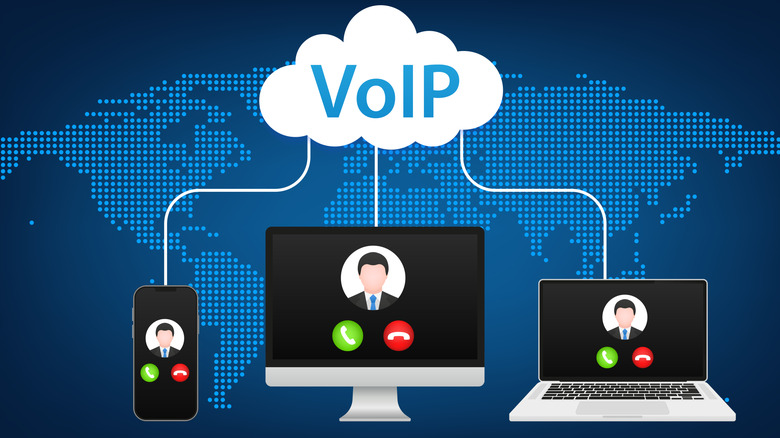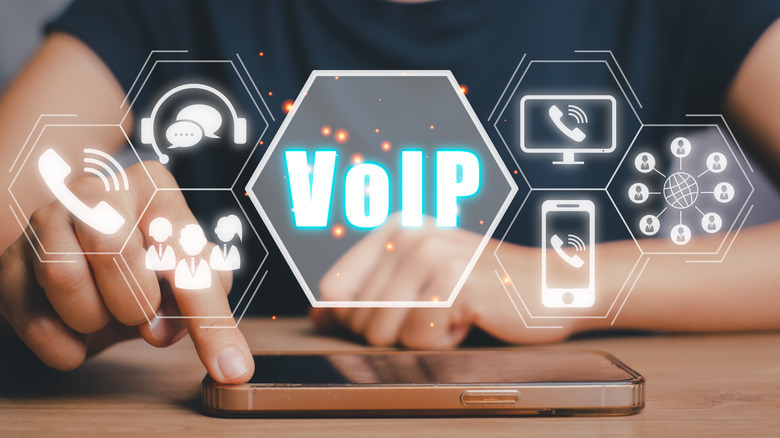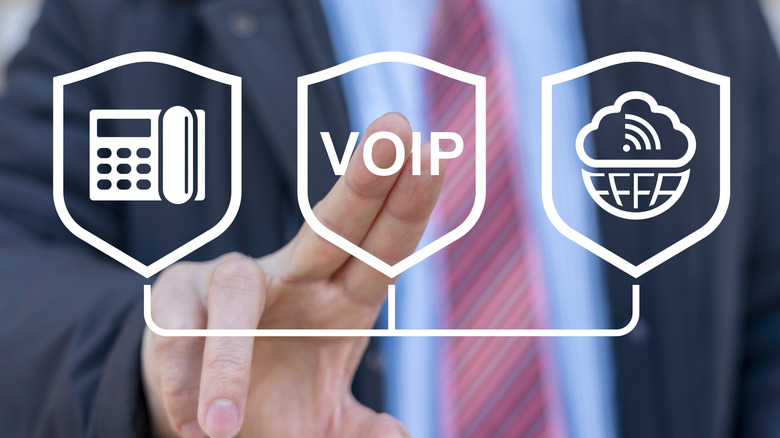What Are The Benefits (And Disadvantages) Of Using A VoIP Phone System?
Gone are the days when communication relied on bulky desk phones and copper wires. In fact, for many young people, traditional landlines have become relics of the past. After all, the ability to make calls over the internet using laptops, smartwatches, and tablets has really shaped how we connect with others. At the heart of that shift is VoIP (Voice Over Internet Protocol). It's a technology that's revolutionizing communication by offering flexible and cheaper solutions than traditional phone systems.
On a basic level, VoIP allows users to make calls (either voice or video) over the internet instead of a regular phone line. As long as you have an app that supports VoIP services like Google Voice and an internet connection, you can make or receive calls (both international and domestic) without racking up massive phone bills. This means that, whether you're working remotely or managing a team across different time zones, you'll have the freedom to stay in touch without being tied to a single physical location.
Indeed, VoIP offers numerous benefits, particularly for businesses seeking to expand their communication capabilities. But despite these perks, there's also a potential dark side to it. For starters, VoIP solely depends on a good internet connection. So, an inconsistent or sluggish internet connection can easily cause audio lag, distorted sound quality, or even dropped calls. That said, if you want to transform how your business handles communication with VoIP technology, here are the pluses and minuses you should ponder before investing in a VoIP system.
A VoIP system will help you stay connected while cutting communication costs
The most obvious perk of switching to a VoIP system is the significant reduction in communication costs. When it comes to traditional phone lines, you'll definitely pay for each minute of the call you make — that's regardless of whether it's long-distance or local. The rates will even be much higher for international calls. However, when you use VoIP phone services, you will make these calls at a fraction of the cost — and sometimes for free — as this tech route calls over the internet. This makes it ideal for remote workers and businesses who rely mainly on voice or video communication.
The savings don't just end with call rates. Since VoIP depends solely on an internet connection, it also eliminates the need for dedicated hardware and phone lines. Some VoIP services, like Google Voice, also offer additional features for free — including call forwarding, voicemail-to-email, and even video conferencing — which are usually expensive add-ons with landline providers.
If you have a growing team or are a frequent traveler, and you're wondering if it's possible to use the same phone number with two phones, a VoIP system allows you to do that across multiple locations. This means that you'll always stay connected irrespective of where you travel.
VoIP systems can help your business grow by supporting scalability
Another compelling benefit of switching to a VoIP phone system is its effortless scalability. Whether you are managing a massive team of remote workers or running a small startup, a VoIP system will eliminate the need for costly hardware upgrades or complex installations when scaling up (or down). After all, with a traditional landline system, you'll have to make significant upgrades if you want to add users. You'll also need a new Private Branch Exchange (PBX) system, additional ports, or even expensive rewiring.
However, with VoIP systems (like Google Voice and other apps like it), you'll leverage your existing internet connection to remove that physical complexity. All you'll need to do is tweak your subscription plan to assign new licenses or plug in additional IP phones with just a few clicks.
Besides that, a VoIP system makes it easier for businesses to support hybrid and remote teams. Whether your employees work from home or overseas, they'll always stay connected as long as they have a reliable internet connection. Not only will this approach contribute to the scalability of your business (mainly if you invest in services like tiered and pay-as-you-go), but it will also give you access to a broader talent pool.
VoIP systems require a constant internet connection
While VoIP brings a lot of cost-saving benefits, the biggest draw is that it's only as reliable as your internet connection. So, if you're dealing with limited bandwidth or slow speeds, the very purpose of a VoIP system will be lost as you'll experience delayed conversations or dropped calls. This makes VoIP systems a tough sell, especially for people in rural areas where high-speed internet is not guaranteed.
However, it's not just about having access to an internet connection; the bandwidth must be strong and stable enough to support high-quality calls. Also, even if your internet speeds are very high, everyday activities — say, streaming Netflix or downloading large files — could affect the call quality, especially if the network isn't well-equipped to handle the extra load.
There is also the issue of power reliability. In case of a power outage, your VoIP service will go down unless you invest in a backup battery system. So, if you are in an area with an unreliable power source, your team or clients may experience difficulties contacting you, which can negatively impact your business.
VoIP may pose security risks without proper safeguards
Another often neglected topic regarding VoIP phone services is online security. Since VoIP relies heavily on the internet, it's vulnerable to a wide range of cyberattacks that target websites or emails. These include phishing attacks, call interception, malware, and, even worse, denial-of-service (DoS) attacks that can shut down the phone system and interrupt business operations.
In the worst-case scenario, hackers could use your VoIP system to eavesdrop on private conversations or steal data and sensitive information, resulting in data breaches, financial losses, and a loss of consumer trust. The good news? These risks are manageable, as there are many ways businesses can defend themselves against cyberattacks.
To defend against these attacks, start by partnering with a reputable VoIP service provider that prioritizes end-to-end encryption and strong authentication protocols. Consider brands like Google Voice, NexTiva, Dialpad, and Ringblaze, which offer built-in encryption, multi-layer authentication, and firewalls to reduce vulnerabilities. You'll also want to enforce cybersecurity best practices. Keep all software updated, use strong, unique passwords to secure online accounts, and train employees to recognize cyber threats.




